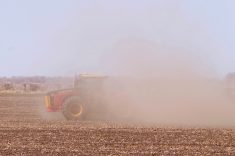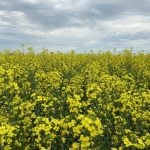What is risk?
In its simplest form, risk is defined as the uncertainty of an outcome with potentially undesirable results.
What is risk management?
- identifying, evaluating and understanding your risks;
- understanding your risk tolerance; and,
- mitigating possible negative impacts and benefitting from potential rewards in taking calculated risks.
I recently became a member of Farm Management Canada’s National Risk Management Roundtable, titled Roots for Success. The goal of this national Roundtable is to improve risk management for the ag and food sector through education and training. We will use baseline data to establish industry benchmarks and identify opportunities for policy and program improvements to meet farmers’ risk management needs.
Read Also

Gentle treatments for pain in the neck
Heading toward year-end, people unknowingly tense up against the cold and busyness, causing neck pain that can often be treated with appropriate support and gentle mobility, athletic therapist Kathlyn Hossack says.
As a member of this roundtable my role will be to:
- Provide insight regarding the state of risk management;
- Provide guidance and feedback to the project team.
- Share and identify the best approaches to implementing a national comprehensive risk management strategy.
- Identify gaps in current policy and programming.
- Identify the best way to establish links between industry initiatives.
The members of this Roundtable and include industry experts from government agencies to private sector businesses and primary producers from across Canada. The project started this past June and will to conclude at the end of 2022.
We just had our first teleconference meeting to review the Roundtable’s objectives and set out plans. We then had a learning session hosted by Farm Management Canada.
Part of the working plan will be to host risk assessment learning sessions for producers and industry across the country early in 2020. These sessions will focus on helping participants build a risk management strategy and introducing them to Agrishield.
Agrishield provides information about farm risk management in areas ranging from family relations to production. The information is available online at MyAgrishield.ca. There is an annual fee of $149 to use the program. This helps offset the costs of support and development. If you take part in one of the training sessions over the next few months you will get free access to the program for a year.
New Year, new strategies
We are in the heart of ag meeting season and the start of a new year which makes it the perfect time to time to review new tools that can help you improve your farm management practices, reduce your risks and improve your farm’s profitability.
It is good practice to review your operations at least annually. Incorporate into your management plan some of the tools that Farm Management Canada has available to farmers such as “The Seven Management Practices Driving Farm Success.”
The study showed results of up to 525 per cent difference on Return on Assets between the top 25 per cent of farms using strong management practices and the bottom 25 per cent of farms that did not.
The research found seven business management practices that drive farm performance.
- Ongoing skills development, lifelong learning.
- Business decisions made using accurate financial data.
- Seeking the help of business advisors/consultants.
- Having a written business plan, following it, reviewing it annually.
- Knowing and monitoring your cost of production.
- Assessing risks and having a plan to manage and mitigate risks.
- Using a budget and financial plan to monitor financial position and options.
Now add to that the ability to use a tool like Agrishield and you can check No. 6 off the list.
Planning and preparing builds confidence, which enables better overall decisions and makes your business more successful.
















